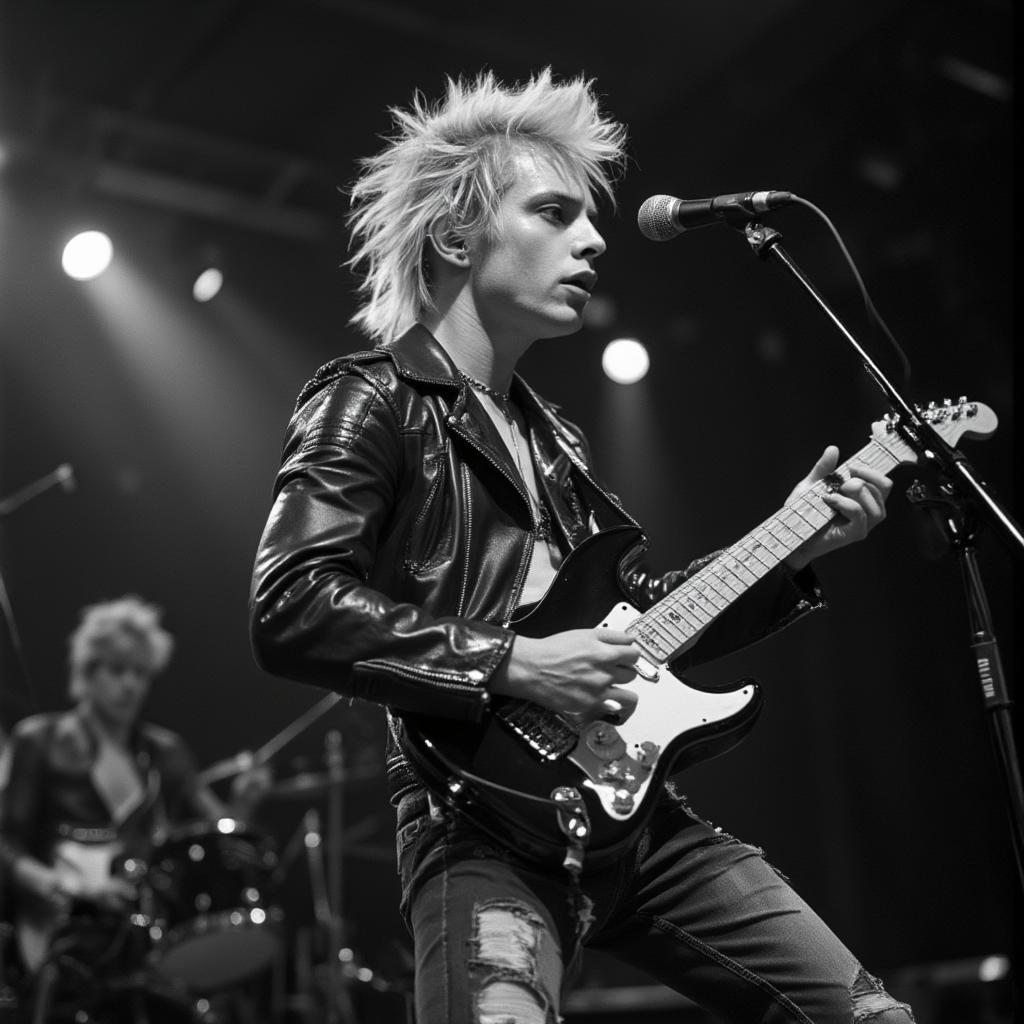Billy Idol: The Rebel Yell That Defined a Generation

Billy Idol, the sneering face of punk-infused rock and roll, exploded onto the music scene in the late 70s and remains a cultural icon today. From his roots in the burgeoning British punk movement to his MTV-fueled superstardom, Idol’s career is a testament to the power of image, attitude, and undeniably catchy hooks. This article delves into the life, music, and enduring legacy of Billy Idol, exploring the elements that contributed to his iconic status and continued relevance in the world of rock music.
From Generation X to Global Icon: Billy Idol’s Rise to Fame
Born William Michael Albert Broad in Stanmore, Middlesex, England, Billy Idol’s journey to rock stardom began with his involvement in the Bromley Contingent, a group of Sex Pistols fans who embraced the punk rock ethos. He briefly attended the University of Sussex but soon dropped out to pursue music, joining the punk band Chelsea before forming Generation X. As Generation X’s frontman and songwriter, Idol honed his skills, crafting a blend of punk’s rebellious energy with a pop sensibility that hinted at future mainstream success. The band achieved moderate success in the UK with hits like “King Rocker” and “Valley of the Dolls,” showcasing Idol’s charismatic stage presence and emerging songwriting talent. However, it was his solo career, launched in 1981 after relocating to New York City, that catapulted him to international fame.

The MTV Era: Visuals and the Power of “Rebel Yell”
Billy Idol’s solo career coincided with the rise of MTV, and he masterfully utilized the platform to cultivate his image as a rebellious rock star. Music videos like “White Wedding” and “Dancing with Myself” showcased his signature sneer, platinum blonde hair, and rebellious attitude, making him an instant MTV staple. His breakthrough came with the 1983 album “Rebel Yell,” which spawned the iconic title track and cemented his status as a global superstar. The anthemic chorus and driving guitar riffs of “Rebel Yell” resonated with a generation yearning for rebellion and self-expression. The song’s accompanying music video, featuring Idol’s electrifying performance and striking visuals, further amplified its impact and became a defining moment in MTV history.
The Influence of Guitarist Steve Stevens
Integral to Billy Idol’s sound was guitarist Steve Stevens, whose virtuosic playing added a layer of sophistication and technical brilliance to Idol’s raw energy. Stevens’ flamenco-inspired guitar work on tracks like “Eyes Without a Face” and “Flesh for Fantasy” provided a unique sonic texture that set Idol apart from his contemporaries. His innovative use of harmonics and tapping techniques revolutionized rock guitar playing, earning him widespread acclaim and influencing countless aspiring guitarists. The chemistry between Idol and Stevens, both musically and visually, was undeniable, contributing significantly to the band’s success.
Beyond the Image: Billy Idol’s Musical Legacy
While Billy Idol’s image undeniably played a crucial role in his success, his enduring legacy rests on the strength of his songwriting and his ability to connect with audiences on an emotional level. His music tapped into the anxieties and aspirations of a generation grappling with societal changes and a desire for individuality. Songs like “Mony Mony,” a cover that he transformed into a stadium anthem, and the introspective ballad “Sweet Sixteen,” demonstrated his versatility and ability to transcend genre boundaries. He wasn’t afraid to experiment, incorporating elements of new wave, pop, and even hard rock into his signature sound.
Billy Idol: A Voice for a Generation? Insights from Dr. Anya Sharma
Dr. Anya Sharma, a renowned musicologist specializing in popular culture, notes, “Billy Idol’s music resonated with a generation disillusioned with the status quo. His rebellious persona and anthemic songs provided a soundtrack for youthful angst and a yearning for change.” This sentiment echoes in the enduring popularity of his music, which continues to resonate with new generations of fans.
Billy Idol Today: Continued Relevance and Influence
Despite the changing landscape of the music industry, Billy Idol remains a relevant and influential figure. He continues to tour extensively, captivating audiences with his high-octane performances and timeless hits. His recent albums, including “Kings & Queens of the Underground” (2014), demonstrate his continued creative drive and ability to evolve while staying true to his rock and roll roots. His impact on contemporary music is undeniable, with numerous artists citing him as an inspiration.
The Enduring Appeal of Authenticity: A Perspective from John “Jax” Jackson
John “Jax” Jackson, a veteran music journalist, observes, “Billy Idol’s enduring appeal lies in his authenticity. He never compromised his vision, and that resonates with fans who appreciate genuine artistry.” This commitment to his artistic vision is evident in his consistent output and his refusal to be pigeonholed.
Conclusion: Billy Idol’s Rebellious Spirit Lives On
Billy Idol’s journey from punk rocker to global icon is a testament to his talent, ambition, and unwavering commitment to his artistic vision. His music, image, and rebellious spirit have left an indelible mark on popular culture. From his early punk roots to his MTV-fueled superstardom and beyond, Billy Idol continues to inspire and entertain, proving that the rebel yell can indeed echo through generations.
FAQ
- What is Billy Idol’s real name? William Michael Albert Broad.
- What band was Billy Idol in before his solo career? Generation X.
- What is Billy Idol’s most famous song? “Rebel Yell” is widely considered his most iconic song.
- Who played guitar for Billy Idol? Steve Stevens.
- What is Billy Idol’s signature look? Platinum blonde spiky hair, sneer, and leather attire.
- When did Billy Idol achieve mainstream success? The early 1980s, particularly with the release of “Rebel Yell.”
- Is Billy Idol still performing? Yes, he continues to tour and release new music.
- What genre is Billy Idol’s music? Primarily rock, with elements of punk, new wave, and pop.
- What impact did MTV have on Billy Idol’s career? MTV was instrumental in his rise to fame, showcasing his image and music videos to a global audience.




